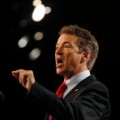In
just his first week as an official candidate, he's faced the dual
headwinds of negative ads highlighting conservative criticism over his
foreign policy views as well as charges of sexism for his combative
reactions in high-profile interviews.
The
early days of a presidential campaign are critically important: It's a
first shot for candidates to define themselves at a time when they'll
attract a swell of generally positive media coverage and get screen time
in front of audiences that don't normally pay attention to politics.

And this early on — Paul was only the
second candidate to jump in the race after Ted Cruz — newcomers face an
onslaught of political media coverage. That means closer than usual
scrutiny of a candidate's record and statements, along with incessant
horse race evaluations of based on optics and the logistics of campaign
rollouts.
"No matter how well-known a
candidate may be going into a roll out tour, the goal of any
presidential announcement event is to provide the optics and visuals
that say, 'Meet the next president of the United States,'" said John
Legittino, who led Mitt Romney's national event production.
For
Paul, it's widely viewed that his Tuesday announcement in Louisville,
Kentucky, successfully set the tone for his campaign. He aimed to appear
like a nontraditional candidate with diverse appeal that would help
expand the Republican base and make him more electable in a general
election. The kickoff event was followed by a media blitz and an early
voting state tour that took him through New Hampshire, South Carolina
and Iowa. On Saturday, he completes the tour in Nevada.
It
was during his media appearances that the narrative of his rollout
started shifting gears. On Wednesday morning, Paul clashed with NBC's
Savannah Guthrie over what he considered editorialized questions and
tried to direct her on how she should conduct an interview. The tense
exchange quickly spread and comparisons were drawn to his heated
reaction in a different interview two months ago when he shushed a
female reporter.
And when Paul was
in New Hampshire later on Wednesday, he got aggravated with an
Associated Press reporter who asked the senator specifics about his
views on abortion ban exceptions.
And this early on — Paul was only the
second candidate to jump in the race after Ted Cruz — newcomers face an
onslaught of political media coverage. That means closer than usual
scrutiny of a candidate's record and statements, along with incessant
horse race evaluations of based on optics and the logistics of campaign
rollouts.
"No matter how well-known a
candidate may be going into a roll out tour, the goal of any
presidential announcement event is to provide the optics and visuals
that say, 'Meet the next president of the United States,'" said John
Legittino, who led Mitt Romney's national event production.
For
Paul, it's widely viewed that his Tuesday announcement in Louisville,
Kentucky, successfully set the tone for his campaign. He aimed to appear
like a nontraditional candidate with diverse appeal that would help
expand the Republican base and make him more electable in a general
election. The kickoff event was followed by a media blitz and an early
voting state tour that took him through New Hampshire, South Carolina
and Iowa. On Saturday, he completes the tour in Nevada.
It
was during his media appearances that the narrative of his rollout
started shifting gears. On Wednesday morning, Paul clashed with NBC's
Savannah Guthrie over what he considered editorialized questions and
tried to direct her on how she should conduct an interview. The tense
exchange quickly spread and comparisons were drawn to his heated
reaction in a different interview two months ago when he shushed a
female reporter.
And when Paul was
in New Hampshire later on Wednesday, he got aggravated with an
Associated Press reporter who asked the senator specifics about his
views on abortion ban exceptions.

Rand Paul sparks abortion uproar with democrat 03:20
"I gave you about a five-minute answer. Put in my five-minute answer," a frustrated Paul said.
He
also got into a mudslinging match with the Democratic National
Committee when he told a reporter at NH1, who also asked a question
about abortion, to challenge the Democratic group's chairwoman.
"Why
don't we ask the DNC, 'Is it okay to kill a seven-pound baby in the
uterus?' You go back and you ask Debbie Wasserman Schultz if she's okay
with killing a seven-pound baby that is just not yet born yet," he said.
While
Paul is known for being accessible to the media and granting a lot of
interviews, he later admitted that he can be "short-tempered" with the
press.
"I think I should have more
patience," he told CNN's Wolf Blitzer on Wednesday, though he argued
that he's not just irritable with female interviewers, a narrative that
Democrats had been pushing all day.
"I
think it's pretty equal opportunity. I was annoyed with a male reporter
this morning. I will have to get better at holding my tongue and holding
my temper," he said.
Republican
strategist Ford O'Connell, who worked on Sen. John McCain's presidential
campaign, said candidates need to understand the level of attention and
close examination that presidential candidates can be exhaustive.
"Even
when you breathe, it's news," he said. "There's always going to be
mistakes, the question is how do you handle those mistakes and move
forward."
Taking on the media can sometimes be strategic for candidates, O'Connell said, but candidates need to pick their battles wisely.
No comments:
Post a Comment